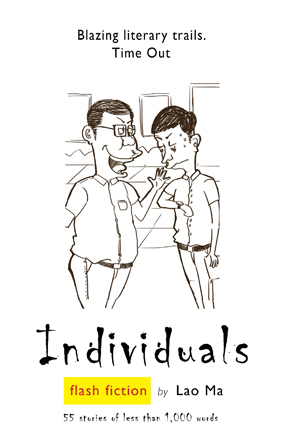Dogs both big and small
by Lao MaNovels are weighty tomes. Short stories fill a few pages. When we pick up a novel that’s as thick as a brick, or open the first book of a series whose volumes might reach our waist if stacked on the floor, we tremble with awe. Compared to a novel, a short story seems as inconsequential as a dry autumn leaf that floats for miles on a mere puff of wind.
The 2012 Nobel literature laureate, Chinese writer Mo Yan, says a novel must be lengthy to qualify as an example of the art form. His major works usually weigh in at several hundred thousand words. According to Mo, “Any novel less than 200,000 words lacks dignity. A leopard might be fierce and brave but he is too short in stature to be the king of the jungle.”
By his standards, Mo Yan is a tiger of a writer.
The Argentine writer Jorge Borges takes a diametrically opposed position: “It’s just madness, laborious and impoverishing madness, composing vast tomes that take five hundred pages to expound an idea which could be perfectly expressed in plain speech in a few minutes.”
Borges’s novels are short and concise.
I side with Borges. Length is not a measure of literary value. Dogs both big and small can bark. Legs long and short can run.
From the foreword to Individuals, translated by Martin Merz.
 Lao Ma (the pen-name of Prof. Ma Junjie) began to write novels in the 1990s, and is recognised as the father of Chinese flash fiction, publishing hundreds of stories in various literary publications. His writings, which have won numerous awards, include the novel Ai Hai Yo (Hey) and the short story collections Sha Xiao (Giggle) and Ge Bie Ren (Individuals). Lao Ma combines his writing with his duties as a professor at the People’s University of China. Individuals, translated by Li Qisheng and Li Ping, is published by Make-Do Publishing.
Lao Ma (the pen-name of Prof. Ma Junjie) began to write novels in the 1990s, and is recognised as the father of Chinese flash fiction, publishing hundreds of stories in various literary publications. His writings, which have won numerous awards, include the novel Ai Hai Yo (Hey) and the short story collections Sha Xiao (Giggle) and Ge Bie Ren (Individuals). Lao Ma combines his writing with his duties as a professor at the People’s University of China. Individuals, translated by Li Qisheng and Li Ping, is published by Make-Do Publishing.
Read more.


